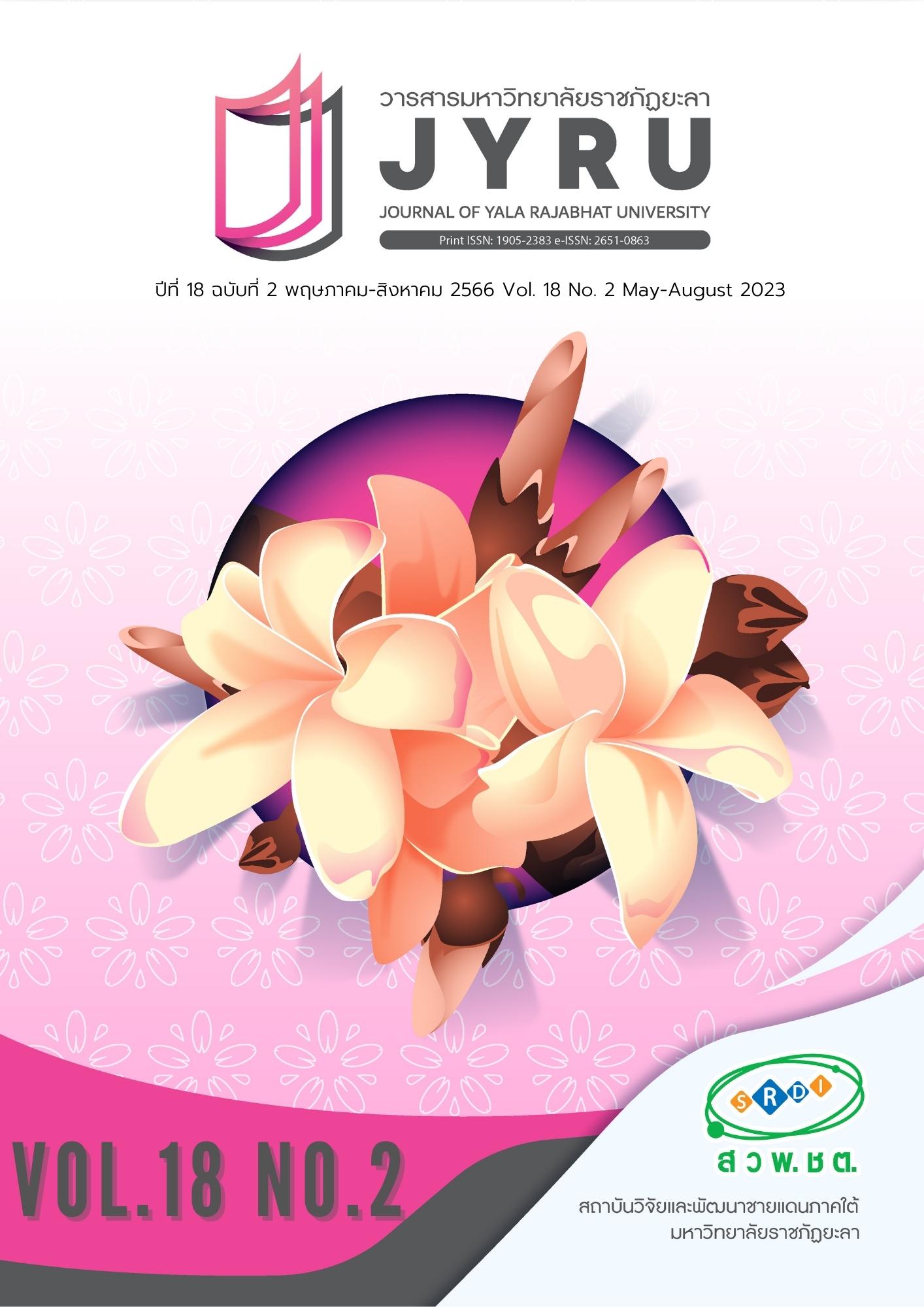การพัฒนาทักษะกระบวนการทางวิทยาศาสตร์และผลสัมฤทธิ์ทางการเรียนของนักศึกษาครูเคมี ผ่านการเรียนแบบออนไลน์อย่างมีปฏิสัมพันธ์ในรายวิชาปฏิบัติการชีวเคมี
Main Article Content
บทคัดย่อ
การวิจัยครั้งนี้มีวัตถุประสงค์ 1) เพื่อเปรียบเทียบทักษะกระบวนการทางวิทยาศาสตร์ก่อนและหลังการเรียนออนไลน์อย่างมีปฏิสัมพันธ์ 2) เพื่อเปรียบเทียบผลสัมฤทธิ์ทางการเรียนก่อนและหลังการเรียนออนไลน์อย่างมีปฏิสัมพันธ์ และ 3) เพื่อหาความสัมพันธ์ระหว่างผลสัมฤทธิ์ทางการเรียนกับทักษะกระบวนการทางวิทยาศาสตร์ และผลที่เกิดขึ้นระหว่างกิจกรรมที่ใช้สื่อออนไลน์ กลุ่มตัวอย่างที่ใช้ในการวิจัย คือ นักศึกษาครูเคมี ชั้นปีที่ 2 จำนวน 19 คน ได้มาจากเทคนิคการเลือกตัวอย่างแบบสะดวก (Convenience sampling) การจัดการเรียนออนไลน์อย่างมีปฏิสัมพันธ์ในรายวิชาปฏิบัติการชีวเคมีดำเนินการผ่านระบบ Google Classroom มีขั้นตอนการจัดการเรียน ดังนี้ 1) การตรวจสอบความรู้ก่อนทำการทดลอง ผ่านโปรแกรม Quizizz 2) การศึกษาสื่อวิดีโอสำหรับหลักการและวิธีการทดลอง ผ่านโปรแกรม Animaker 3) การดูสื่อวิดีโอสำหรับการทดลอง ผ่านโปรแกรม Edpuzzle และ 4) การสรุปและรายงานผลการทดลอง เครื่องมือที่ใช้ในการเก็บรวบรวมข้อมูล ประกอบด้วย 1) แบบทดสอบผลสัมฤทธิ์ทางการเรียนเนื้อหาชีวเคมี 2) แบบทดสอบวัดทักษะกระบวนการทางวิทยาศาสตร์ สถิติที่ใช้ในการวิเคราะห์ข้อมูล ได้แก่ ค่าเฉลี่ย () ส่วนเบี่ยงเบนมาตรฐาน (S.D.) สถิติทดสอบวิลคอกซัน (Wilcoxon signed rank test; non-parametric statistics) และค่าสัมประสิทธิ์สหสัมพันธ์ของเพียร์สัน ผลการวิจัยพบว่า 1) ค่าเฉลี่ยทักษะกระบวนการทางวิทยาศาสตร์หลังเรียนสูงกว่าก่อนเรียนผ่านการเรียนออนไลน์อย่างมีปฏิสัมพันธ์ อย่างมีนัยสำคัญทางสถิติที่ระดับ .05 2) ผลสัมฤทธิ์ทางการเรียนหลังเรียนสูงกว่าก่อนเรียนผ่านการเรียนออนไลน์อย่างมีปฏิสัมพันธ์ อย่างมีนัยสำคัญทางสถิติที่ระดับ .05 3) ความสัมพันธ์ระหว่างผลสัมฤทธิ์ทางการเรียนกับทักษะกระบวนการทางวิทยาศาสตร์ และผลที่เกิดขึ้นระหว่างกิจกรรมที่ใช้สื่อออนไลน์ มีความสัมพันธ์กันทางบวกระดับปานกลางถึงค่อนข้างสูง อย่างมีนัยสำคัญทางสถิติที่ระดับ .05
Article Details

อนุญาตภายใต้เงื่อนไข Creative Commons Attribution-NonCommercial-NoDerivatives 4.0 International License.
บทความ ข้อมูล เนื้อหา รูปภาพ ฯลฯ ที่ได้รับการเผยแพร่ในวารสารมหาวิทยาลัยราชภัฏยะลานี้ ถือเป็นลิขสิทธิ์ของวารสารมหาวิทยาลัยราชภัฏยะลา หากบุคคลหรือหน่วยงานใดต้องการนำทั้งหมดหรือส่วนหนึ่งส่วนใดไปเผยแพร่ต่อหรือกระทำการใดๆ จะต้องได้รับอนุญาตเป็นลายลักษณ์อักษรจากวารสารมหาวิทยาลัยราชภัฏยะลาก่อนเท่านั้น
เอกสารอ้างอิง
Ajareewattana W. (2019). Online teaching and learning during the COVID-19 pandemic of M.B.A. students. Bangkok: Ramkhamhaeng University. (in Thai)
Chaytor, J. L., Al Mughalaq, M., & Butler, H. (2017). Development and use of online prelaboratory activities in organic chemistry to improve students’ laboratory experience. Journal of Chemical Education, 94(7), 859-866.
Damrongkiattisak W. & Achaphet N. (2014). Learning achievement through interactive multimedia with different narration techniques of Maejo university students, Chiang Mai. Journal of Management Science Chiangrai Rajabhat University, 9(2), 114-140. (in Thai)
Díez-Pascual, A. M. & Jurado-Sánchez, B. (2022). Remote teaching of chemistry laboratory courses during COVID-19. Journal of Chemical Education, 99(5), 1913-1922.
George, D. & Paul, M. (2019). IBM SPSS statistics 26 step by step: A simple guide and reference (16th ed). New York: Routledge.
Jolley, D. F., Wilson, S. R., Kelso, C., O’Brien, G., & Mason, C. E. (2016). Analytical thinking, analytical action: using prelab video demonstrations and e-quizzes to improve undergraduate preparedness for analytical chemistry practical classes. Journal of Chemical Education, 93(11), 1855-1862.
Jongjaisit, N. (2020). Creating interactive lesson materials with Edpuzzle [online]. Retrieved July 31, 2022, from: https://anyflip.com/zdvmx/crgl/basic. (in Thai)
Ju, S. Y. & Adam, Z. (2018). Implementing Quizizz as game-based learning in the Arabic classroom. European Journal of Social Science Education and Research, 5(1), 194-198.
Kanchanawasee, S. (2009). Assessment theory (7th ed). Bangkok: Chulalongkorn University Press. (in Thai)
Kuder G. F. & Richardson, M. W. (1937). The theory of the estimation of test reliability. Psychometrika, 2(3), 151-160.
Lohthongkham, P., Wongma, S. & Kopsiripat, W. (2021). Developing an online interactive learning process. to promote learning for the course taking care of pets for their enjoyment. The 14th National and International Research Conference, 18 August 2021. Bangkok: Suan Sunandha Rajabhat University. (in Thai)
Marpaung, T. & Hambandima, E. S. N. (2019). Exploring animaker as a medium of writing a descriptive text: EFL students’ challenges and promoted aspects of digital storytelling literacy. Academic Journal of Educational Sciences, 3(2), 27-32.
Moozeh, K., Farmer, J., Tihanyi, D., Nadar, T., & Evans, G. J. (2019). A prelaboratory framework toward integrating theory and utility value with laboratories: student perceptions on learning and motivation. Journal of Chemical Education, 96(8), 1548-1557.
Pulukuri, S. & Abrams, B. (2020). Incorporating an online interactive video platform to optimize active learning and improve student accountability through educational videos. Journal of Chemical Education, 97(12), 4505-4514.
Shelby, S. J. & Fralish, Z. D. (2021). Using edpuzzle to improve student experience and performance in the biochemistry laboratory. Biochemistry and Molecular Biology Education, 49(4), 529-534.
Stieff, M., Werner, S. M., Fink, B., & Meador, D. (2018). Online prelaboratory videos improve student performance in the general chemistry laboratory. Journal of Chemical Education, 95(8), 1260-1266.
Tangpanthong, C. (2017). Factors affecting online learning achievement for enhancing teaching and learning. Master's Thesis. Chulalongkorn University. (in Thai)
Tatli, Z. & Ayas, A. (2013). Effect of a virtual chemistry laboratory on students’ achievement. Journal of Educational Technology & Society, 16(1), 159-170.


